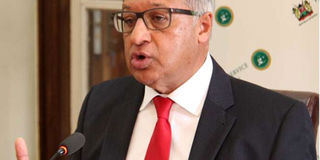Visram denies being ‘overly touchy’ in his relations with media

Court of Appeal Judge Alnashir Visram appears before the Judicial Service Commission for an interview for the position of Supreme Court judge on August 29, 2016. He insisted that there should be a balance between media freedom and freedom of expression. PHOTO | DENNIS ONSONGO | NATION MEDIA GROUP
What you need to know:
- Justice Visram has in the past awarded President Daniel Moi-era Cabinet minister Nicholas Biwott Sh30 million in a suit against a newspaper.
A Court of Appeal judge on Monday denied being “overly touchy” and unable to appreciate constitutional rights on media freedom and freedom of expression.
Justice Alnashir Visram, who has in the past ruled on several defamation suits against the media and awarded millions of shillings in damages, told the Judicial Service Commission (JSC) that media freedom should not be curtailed.
“Media freedom is absolutely essential; if media fails, society will fail to analyse issues, but media should exercise the responsibility such that media freedom is not seen to hurt other people’s rights,” he said during the interview for position of Supreme Court judge.
He insisted that there should be a balance between media freedom and freedom of expression.
He was responding to Commissioner Tom Ojienda’s question on whether the public could perceive him as “overtly touchy” following his past judgements relating to media freedom.
“There is absolutely no way I could use my office to curtail media freedom,” he said.
Justice Visram has in the past awarded President Daniel Moi-era Cabinet minister Nicholas Biwott Sh30 million in a suit against a newspaper, Sh25 million in another defamation suit filed against the UK-based publishers of the book, Dr Ian West Casebook, and its two authors.
He was himself recently awarded Sh26 million against a newspaper for defamation.
Questioned about a letter he wrote to the Daily Nation on a story that had been done about him recently, Justice Visram responded that the letter was private and was not intended for the public and that he was only seeking to put facts straight.
Two judges who were set to appear before the JSC cancelled their appointments.
Instead, they asked to be rated on the past interviews for positions of chief justice and deputy chief justice.
They were High Court’s Msagha Mbogholi and Court of Appeal’s Agnes Murgor, respectively.





